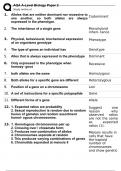Exam (elaborations)
AQA A-Level Biology Paper 2
- Module
- AQA A-Level Biology Paper 2
- Institution
- AQA A-Level Biology Paper 2
1. Alleles that are neither dominant nor recessive to one another, so both alleles are always expressed in the phenotype. Codominant 2. The inheritance of a single gene Monohybrid inheri- tance 3. Physical, behavioural, biochemical expression of an organisms genotype Phenotype 4....
[Show more]



